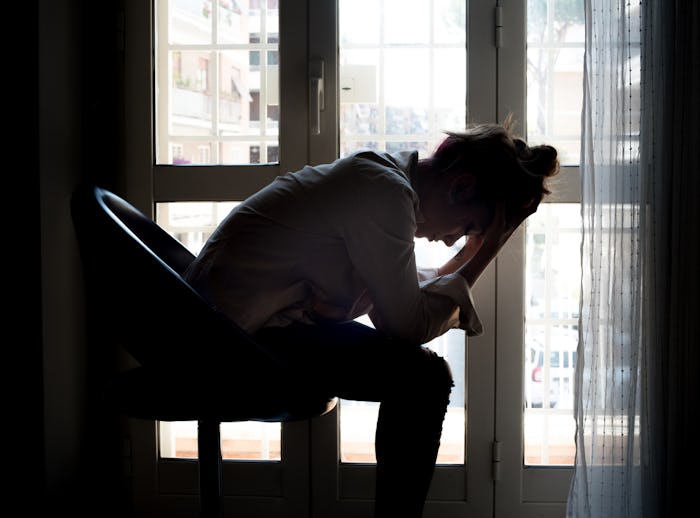Life

8 Things Every Sexual Assault Survivor Wants People To Know When She Becomes A Mom
When I became a mom I shed a lot of identities that no longer served me. Some of these included partier, weekend-long-binge-TV-watcher, someone who sleeps in on the weekends, and, well, you get the idea. There are some identities I couldn't shed, though, and being a survivor of sexual assault was one of them. While we're not all the same, and I know I can only speak for myself, I do believe there are things every sexual assault survivor wants people to know when she becomes a mom. Because even though we come from different backgrounds, and live different lives, we do have some things in common. For example, none of us are alone.
It's no secret that surviving sexual assault also often means surviving years, if not a lifetime, of entrenched, malignant shame. Shame so profound and oppressive that it can effect every facet of the way we see ourselves, the way we interact with others, our physical health, and even how much success we are deemed worthy of. That shame even, and perhaps especially, permeates motherhood. Many of us who were abused as children had parents or caregivers who didn't see the signs and couldn't — or didn't — protect us. My own mom was the light of my life since birth, and she didn't know I was being abused until I told her.
The fear that my kids could be in a similar situation, and I might not know it, is absolutely horrifying to me. That fear has definitely impacted my parenting, and that fear is something those around me need to be aware of. So with that in mind, here are a few things every sexual assault survivor wants people to know when she becomes a mother:
We're Constantly Thinking About How To Protect Our Children
When I say constantly, I mean from the moment that I learned I was pregnant to right now. Every single second of my time, even when I'm focused on doing something else, there is a part of my brain that is working on how best to protect my children from becoming victims. Every. Single. Second.
We're Wondering If You're A Perpetrator
I don't care who you are , if you're in contact with my child, and you're not me or a child yourself, I've wondered if you will turn out to be a perpetrator. According to the Rape, Abuse, Incest National Network (RAINN), "[t]he majority of perpetrators are someone the child or family knows. As many as 93 percent of victims under the age of 18 know the abuser."
Becoming A Mother Was A Revolutionary Act
My primary perpetrator built his world of abuse upon me being somehow too emotional, too flawed, and/or too soft to be anything of any use to anybody. Becoming a mother blew that bullsh*t story line he used to control me out of the water.
Ending Rape Culture Is Our Parenting Duty
When I became a parent some people seemed shocked that I didn't all of a sudden drop my activism and advocacy for survivors of sexual trauma. That always struck me as bizarre. How does having a child make someone forget that rape culture is a problem that needs fixing? How do children magically change the importance of dismantling the patriarchy? On the contrary, parenthood didn't make me less focused on these things, it made me more focused on them. Everything I do is with the hope that my children won't be fighting these same fights when they're my age.
It's Never Too Early To Teach Consent
I got some pretty strange looks each time I had a newborn and began immediately teaching them about consent. Just like it's never too early to start teaching your children about unconditional love, it's never too early to teach them that they have bodily autonomy, and so does everyone else. From day one I help my kids learn that respecting both is mandatory (in age appropriate ways, of course).
Our Boundaries Are Not "Too Harsh"
To be honest, I've had some people tell me I should ease up on the boundaries around what types of behaviors I do and do not allow my children to be around. I've even been called a helicopter parent once or twice because of the misconception that strict boundaries mean I'm overprotective.
Let me set the record straight: demanding our family's rules about consent, bodily autonomy, and respecting others' identities are followed in order to be in my child's life is not helicopter parenting. If you think that my boundaries are too harsh, I think your intentions may not be so pure and we can part ways.
Childbirth Was Extraordinarily Healing
My disclaimer here is that the opposite can also be true. As a trauma therapist, I don't think it would be a stretch to say that childbirth is often triggering for survivors. That, fortunately, was not my experience. There was something about being totally out of control of my body in a way that ultimately proved my body could handle itself that helped me see my body as stronger, braver, and more beautiful than I'd ever given it credit for.
My body was finally no longer his. It was my own.
We All Have Different Stories
Mothers who are survivors of sexual assault are not a homogeneous group. All of our stories will be unique, even when they overlap. If I had to bet, however, I'd wager that the one thing that unites us all is our deep commitment to making sure what happened to us never happens to our children.
If you are a survivor of sexual assault, please seek professional help or call the National Sexual Assault Hotline at 1-800-656-4673.
Watch Romper's new video series, Romper's Doula Diaries:
Check out the entire Romper's Doula Diaries series and other videos on Facebook and the Bustle app across Apple TV, Roku, and Amazon Fire TV.